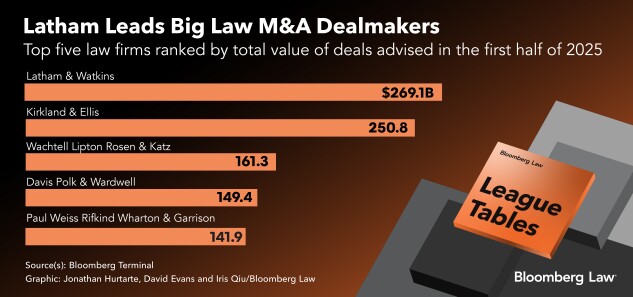Large law firms have an edge in landing work on mega deals in the pipeline tied to artificial intelligence, according to Latham & Watkins’ new M&A and private equity global co-chair.
The transactions center on artificial intelligence data centers and infrastructure that supports them, partner Alex Kelly said. They require teams operating across industries and practice groups, which smaller firms lack, she said.
“The intersection of technology, infrastructure, real estate, and regulation make a perfect deal for us because you need a firm that can speak all of those languages fluently,” Kelly said. “Our clients are gravitating towards firms that can deploy deal teams across jurisdictions overnight.”
Kelly’s contention that big law firms are in the best position to garner M&A work is bolstered by Bloomberg Law data from the first half of the year. Four of the five firms that brought in the most M&A work were also among the 20 largest for overall revenue.
Latham ranked first among those four with deals worth about $269 billion, including guiding CyberArk Software Ltd. in its $25 billion sale to Palo Alto Networks Inc. Kirkland & Ellis followed at nearly $251 billion, along with Davis Polk & Wardwell ($149 billion), and Paul Weiss Rifkind Wharton & Garrison ($142 billion).
Only Wachtell Lipton Rosen & Katz, which ranked third among the top five with deals worth about $161 billion, is not among the country’s 20 highest-revenue firms. The Wall Street firm, known for its lean structure compared to other top deals advisers, ranked 50th among law firms for overall revenue in fiscal 2024, according to data from the American Lawyer.
Latham’s M&A lawyers have steered several of the largest AI and data center-related mega deals so far this year. Those include the CyberArk sale, which was announced in July; advising Amphenol Corp. in its $10.5 billion purchase of CommScope Holding Co.'s connectivity and cable solutions business in August; and steering Meta Platforms’ $14 billion investment in upstart Scale AI in June.
It falls on Kelly to keep Latham near the top of the leader board. She was tapped in May to co-lead the firm’s M&A and private equity practice group, alongside Paul Kukish. Kelly has spent more than 15 years at Latham, beginning as a summer associate.
Running the M&A team comes after several years of leadership positions within the firm, which Kelly says has a culture of giving both associates and partners a role in managing the firm. She participated as a junior partner in Latham’s associates committee, which focuses on issues like progression and bonuses.
Kelly’s asset management M&A clients include Sixth Street Partners, Ares Management Corporation, PIMCO, and Hunter Point Capital. She has also advised private equity players like Warburg Pincus, Hg Capital, and Entrepreneurial Equity Partners.
Rocky Market
AI’s rapid rise puts a spotlight on regulation, as lawmakers and lawyers grapple with antitrust and security concerns related to deals and foreign supply chains.
“We’re going to see people thinking about antitrust risks globally where AI seems to be getting aggregated all in the hands of one user,” Kelly said.
At the same time, market conditions and tariffs are still top of mind for lawyers, who expect deals to pick up further once tariff policy under the Trump Administration settles. Accepting an unfavorable tariff rate in a key region may still preferable than waiting for it to potentially fall because lawyers and their clients will be able to value a transaction and have stability to make decisions.
“With the yo-yo, tariff policy folks don’t have any certainty to what’s going to happen,” Kelly said.
Broadly, the market is still adjusting after a period of rocky macroeconomic conditions, which have also made going public an inefficient exit option for many large private companies.
Client instead are opting to sell their companies in “dribs and drabs” to multiple sponsors to help owners get liquidity. Meanwhile, private equity owned companies continue to see single-asset continuation vehicles, where sponsors are kicking the can down the road, Kelly said.
“We’ve seen a significant increase in the amount of minority deals,” Kelly said. “In some cases, we’ve seen hybrid, preferred structured instruments to help sponsors get liquidity.”
To contact the reporter on this story:
To contact the editors responsible for this story:
Learn more about Bloomberg Law or Log In to keep reading:
See Breaking News in Context
Bloomberg Law provides trusted coverage of current events enhanced with legal analysis.
Already a subscriber?
Log in to keep reading or access research tools and resources.



